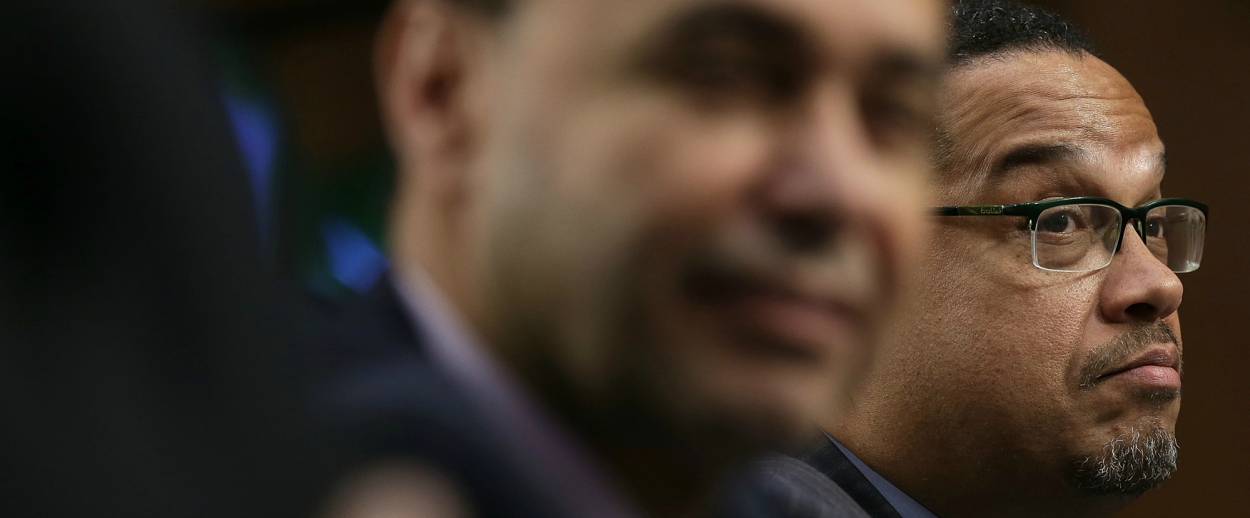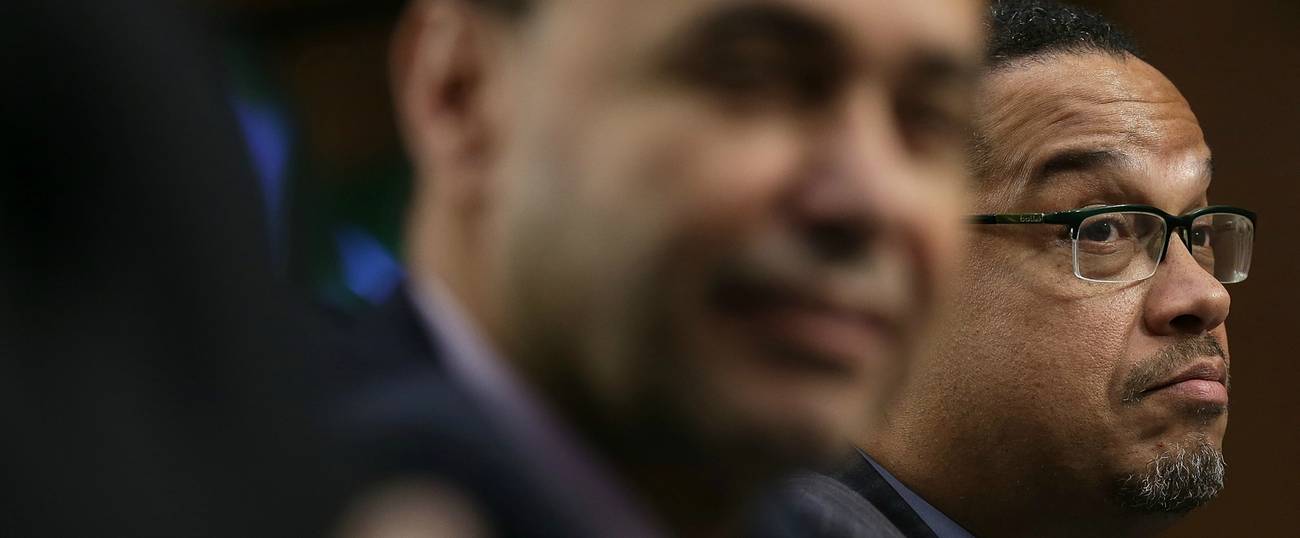Keith Ellison’s Life as NIAC Cheerleader
The would-be head of the DNC has a long, cozy history with the Tehran lobby




July of 2009 was not the most obvious time to argue against sanctioning Iran. In June, the regime violently suppressed a widespread protest movement that emerged in response to the alleged rigging of the country’s presidential election. Mir Hossein Moussavi, who the regime had declared the election’s loser, was under house arrest, securing the belligerent Holocaust denier Mahmoud Ahmadinejad a second term in office. Iran was also operating 3,800 uranium enrichment centrifuges and stonewalling international nuclear monitors, in violation of international law. As a result, even President Obama and members of his administration who favored dialogue were suggesting the need for more intensive U.S. sanctions against a country that leaders of both parties agreed posed a potential nuclear threat.
But for Keith Ellison, then a freshman congressman from Minnesota, mid-2006 was an ideal time for the U.S. to try something radically different in its relations with Tehran. “I haven’t been persuaded that the best thing for us to do is to rush to crippling sanctions,” said Ellison during a July 22, 2009 House Foreign Affairs Committee hearing covering recent developments in Iran. Although Ellison clarified he was “not in principle against sanctions,” he argued that Washington could not shape Iranian behavior without broader international cooperation: “We have sanctioned ourselves out of sanctions unilaterally,” Ellison said, years before many of the most restrictive U.S. measures had even been introduced.
Ellison also submitted an op/ed piece by Trita Parsi, the founder and president of what was then a little-known organization called the National Iranian American Council, and a strong proponent of closer U.S. ties with Iran, into the committee’s hearing record. (In a March 2011 speech at a NIAC event, Ellison thanks Trita Parsi for being “an indispensable partner” in helping to develop a 2009 bill that would have sanctioned individual human abusers in Iran while lifting U.S. restrictions on NGO work in the country, and refers to the NIAC founder as a “friend.”)
Ellison is now vying to be head of the Democratic National Committee, and his statements at the 2009 hearing are part of a larger pattern of taking views on Iran that put him in the minority of the party he hopes to lead. If Ellison does become DNC head, the Democrats will have elevated an outspoken proponent of a transformed U.S. policy towards Tehran who has taken a notably independent course, even in relation to other Democrats—including Obama, whose early outreach efforts were scuttled after the existence of Iran’s secret Fordow uranium enrichment facility was exposed in September of 2009.
Ellison’s wariness of increased U.S. sanctions continued well beyond that point. During a March 2011 address at a National Iranian American Council event, Ellison voiced his support for the U.S. opening a diplomatic interest section or embassy in Tehran, something that the notably pro-engagement Obama has been careful not to publicly endorse. He also appeared to argue against sanctioning non-Iranian companies for doing business in Iran: “We have sanctioned Iran so much we have almost no levers to play on this,” said Ellison. “Now we’re at the point of sanctioning our economic partners who will then impose sanctions on them. Very sad, very not exactly a direct relationship.”
In the same speech, Ellison cited the tear gas attacks against anti-regime Egyptian protesters as an example of when U.S. sanctions would be morally and strategically prudent. “You and I as Americans do not want any Egyptian who is fighting for civil or human rights to have to pick up a tear gas canister that says ‘made in America,’ said Ellison. “If that government’s going to oppress people they can’t do it with our participation. That’s a good reason for sanctions….” The Iranian nuclear program appeared to strike Ellison as a less deserving target.
It is unusual to hear even dovish Democrats talk about dramatically upgrading relations with a self-proclaimed enemy of the United States without exacting any changes in behavior from the country: As Ellison said in his NIAC talk, “When we put up an embassy or an interest section in another country, it’s not a gift to them… You’re not doing something for the other country by having someone to look after our interests there, and by withdrawing it, it’s not a punishment.” Along with the idiosyncratic Dennis Kucinich and Justin Amash, Ellison was one of only 11 members of Congress to vote against the Iran Threat Reduction and Syria Human Rights Act in December of 2011, which expanded sanctions against Iran’s energy sector.
In August of 2013, NIAC lauded Ellison for being one of 20 members of the House of Representatives to “stand up to the war lobby” by opposing additional sanctions in a House vote that occurred three months before the start of serious, publicly acknowledged nuclear negotiations with Iran. In May of 2015, Ellison was one of only five Democratic members of Congress to vote against the Iran Nuclear Agreement Review Act, which submitted the July 2015 nuclear deal to a potential vote and compelled the White House to disclose documents relevant to the agreement to Congress. (A number of hawkish Republicans, including incoming CIA director Mike Pompeo, also voted against the bill, but because they felt its oversight mechanisms weren’t rigorous enough).
Keith Ellison’s long-term relationship with Louis Farrakhan and the Nation of Islam may be in his past, while leading Jewish Democrats like Chuck Schumer continue to vouch for his present status as a “friend” of Israel—even despite his embrace of clerics who fund Hamas and his public positions against funding missile defense programs for the Jewish State. Yet if Ellison does become DNC chair, it would bring enthusiastic and often uncritical supporters of the U.S.-Iran relationship closer to the center of power of the Democratic Party. It would also create an unavoidable contrast with the incoming Republican president, who has stocked his administration with national security figures who are deeply skeptical of Tehran—thereby cementing the Iran Deal as a defining feature of America’s partisan divide.
Previous: Keith Ellison Allegedly Said U.S. Foreign Policy Is ‘Governed’ by Israel
ADL Reverses on Keith Ellison, Now Opposes His DNC Leadership Bid
Related: Keith Ellison Supported the BDS Movement and Admired Louis Farrakhan. So Why Are Jewish Democrats Supporting Him for Chairman of the DNC?
Armin Rosen is a staff writer for Tablet Magazine.